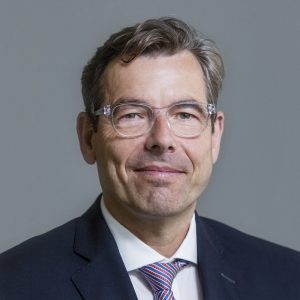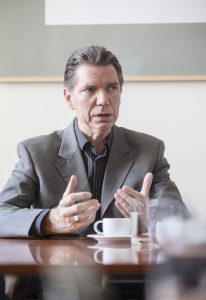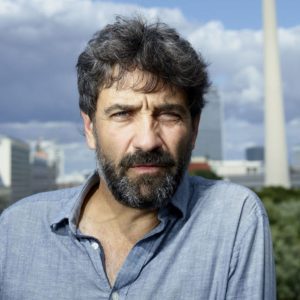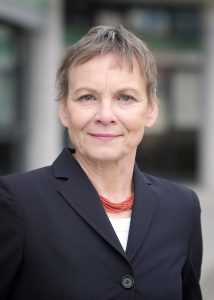This is something that has been demanded by various groups within society for a long time, and the work of grappling with it has been politically mandated in the government’s coalition agreements at both state and federal level. What options can the Forum offer for dealing with colonialism and coloniality? How can a common understanding and a common language be found? And how can dialogue succeed, both internally and externally? That is the focus of this feature. It is to be treated as an open-ended endeavour.
To begin the process, the feature’s editorial team spoke with the directors of the four institutions involved in the Humboldt Forum, whose programmes will play a significant part in determining its character: Hartmut Dorgerloh (Stiftung Humboldt Forum im Berliner Schloss), Lars-Christian Koch (Ethnologisches Museum Berlin, Museum für Asiatische Kunst, and Stiftung Humboldt Forum im Berliner Schloss), Sabine Kunst (Humboldt-Universität zu Berlin, HU), and Paul Spies (Stiftung Stadtmuseum Berlin).
In dealing with the issues pertaining to colonialism and coloniality, one of the Humboldt Forum’s key concerns is the question of what it seeks to be as a community of stakeholders. The conversation kicked off with this question:
Paul Spies: The different parties involved in the Forum are trying to form a kind of alliance and forge common links. The opening is actually the start of the process inasmuch as we are saying: This is what we have, but what should it actually be like? We’re asking questions, but we’ve refrained from making.
Sabine Kunst: Another aspect of this is to view discourse and critical examination, a change in perspective, and listening to one another as elements in the Humboldt Forum’s process of “becoming”.
Lars-Christian Koch: For us as museums, this represents a very clear opening: an opening that not only has a bearing on a European audience but also affects a global audience. We need to become much more explicitly involved in the current global discourses and engage in further dialogues.
Hartmut Dorgerloh: And we’re also a transformative space for introducing people to particular issues within specialized discourses. Which also means that it is incumbent on us to do things differently from the way they are done in the academic and activist context. We need to think about how to make that translation.
One area that has been contentious right from the start and is now increasingly being looked at through the lens of colonial history is the reconstruction of the historic facades of the Berlin Palace. In conjunction with the dome, featuring a Christian cross, the facades project power and entitlement and are at odds with the viewpoints and attitudes of a diverse society.
Sabine Kunst: I see it as a place with flaws that people have very mixed feelings about. It is interesting in terms of the role science has played there over the centuries – the topography of power. But none of the people here were involved in the basic decision to restore the palace in this form with a partially reconstructed facade.
Paul Spies: If you want to achieve decolonization, you need to decentralize your thinking, which makes the site problematic precisely because it is so central. We’re here to discuss the problems posed by this building. We’re not going to defend it. It was a really courageous act on Germany’s part to make the best site in the country available for this kind of incongruity.
Hartmut Dorgerloh: The programming is also informed by this sense of dynamic tension. You can’t separate the content from the architecture, even if at first sight the very modern interior and its contents may have nothing to do with the building in formal terms. Whatever happened on this square at the heart of the capital had a special symbolic, political, and historical dimension – even the social and political processes that prefaced the decision to reconstruct the facades in 2002. But we’re also dealing here with a place in which historical testimonies have been eradicated, as well as with the debates on remembrance and reappraisal that have followed on from this. These are all facets that we need to address in our programming, and I think it’s a question of how we can turn the inconsistencies and contradictions relating to the architecture and history of the place into fertile ground for our programming work. This is important both in terms of the key issue of colonialism and coloniality and for the many people who will come together here without having any biographical point of reference for this place.
Lars-Christian Koch: Our exhibitions and the themes we cover should be measured in terms of how we deal with these contexts. At the same time – and this was one of the ideas underpinning the Humboldt Forum project – we are bringing the global aspect of art and ethnology right into the heart of the city.
The decision to name the Humboldt Forum after the brothers Wilhelm and Alexander von Humboldt was a political one. Positioning the Forum in programmatic terms has now become the subject of critical scrutiny. The brothers’ work and the details of their lives are now more explicitly set within the context of their time and of colonialism in particular. What effect does this have on the way we relate to the Humboldt brothers?
Sabine Kunst: We shouldn’t skirt around the fact that the Humboldt brothers were not just the scions of a privileged class but also products of the time in which they lived. But it is also up to us to take the potential generated by the two brothers’ research work and translate it into the twenty-first century: the idea, for example, of networking and the global, transdisciplinary approach adopted by Alexander von Humboldt, which has taken on renewed interest for us today.
Hartmut Dorgerloh: I see the choice of name as a call in so far as to do as the Humboldts did in their day, prompting us to emulate their commitment, curiosity, and openness in pondering present-day global contexts and contemplating the tasks we face in fashioning a shared future. Our goal now is to question, from a modern perspective, the historical values that the Humboldt brothers represent and the contexts in which these values came to the fore.
Paul Spies: It’s not enough to study the Humboldts and leave it there. We must also look at the research they conducted and the consequences of this. Their work on topics such as mapping and identifying mineral resources also paved the way for colonization by the West. What has got lost in our view of the Humboldt brothers and their accounts of the world? What has gone awry? It’s now a question of not only recognizing this and giving it a name but also very deliberately shifting perspective and listening to the people who have had to bear the consequences of these colonial structures, and indeed still do so.
Parts of the ethnological collections of the Staatliche Museen will soon be on display at the Humboldt Forum in the centre of Berlin. There have been long-running debates about how the provenance of the objects, most of which come from colonial contexts, impact the Humboldt Forum and the way the museums deal with them. The complexity of the historical, political, legal, ethical, and museum-related contexts raises questions about how the Humboldt Forum sees itself, as a place that also presents the material heritage of many different regions of the world.
Sabine Kunst: Objects represent a pooling of knowledge, which is why it is so important that everyone has access to them and that they can be made the focus of research and learning, because knowledge should as a matter of principle be made available to as many people as possible. The question of availability is thus a key concern in all the collections. Moreover, in all cases where we can verify that an object was acquired illegally, it must be restored to its rightful owner, insofar as they can be identified. Provenance research, learning about the origins of an object, is paramount here. In the Humboldt Labor, every object is examined to determine where it came from, what its history is, and how it found its way into the collections.
Paul Spies: I also think that the history of the collections in Berlin is a very important issue that we must keep tackling and responding to: this is not just about the society – in Tanzania, for example – but also about how objects from Tanzania came to Berlin and how we deal with them today. It’s about how we enter into dialogue with people from Tanzania who live here in Germany and are campaigning for the restitution of these objects, and how we work together to create a procedure for returning them.
Lars-Christian Koch: We will present the objects in the exhibitions in such a way that colleagues and partners from the realms of politics, science, and civil society are able to have their say and the process of dialogue becomes a visible element in the exhibitions. As a museum, we don’t want to come out with justifications but rather provide a sense of perspective and demonstrate that international cooperation is at the heart of the matter and can also facilitate restitution. It’s not about excluding alternatives and saying that just because something is on display at the Humboldt Forum, it has to stay that way. That can’t be the point of the process.
The European colonialist past and its present-day aftermaths are wide-ranging issues in society that need to be debated and require communication and understanding between many different individuals, groups, and institutions. As protagonists in the Humboldt Forum, how do you see your role here, and what part does the Forum itself play in positioning itself within these debates?
Hartmut Dorgerloh: We want to configure the content of the Forum in consultation with Berlin’s communities as well as with national and international ones. We want the Humboldt Forum to be a place that people can use. We would like to create spaces in which different realities can be seen and heard. Of course, this requires curatorial choices to be made as well as decisions on the part of the various actors involved. The idea is not to get bogged down in symbolic actions but to make a contribution to society.
Paul Spies: Although we divide up certain areas of responsibility between us, I also think that everything belongs together and must be thought of as a whole. We need to have more concrete discussions about who takes on what tasks and issues and which of them we tackle together.
Lars-Christian Koch: We have a clear position on what our main focus will be over the next few years: colonialism and coloniality are key areas of concern, both for us as a field of scholarship and for civil society. At the same time, we mustn’t lose sight of the fact that these debates are happening in different forms all over the world, and this is also pertinent in coming to an understanding of the issues involved.
Sabine Kunst: There is extensive discussion at the HU of subjects like colonialism, coloniality, and racism, accompanied by a wide range of research projects looking at these questions from a variety of different perspectives. We hope that we can also take a broader approach to these issues at the Humboldt Forum.
As we’ve just discussed together, the Humboldt Forum is at the beginning of a long process. Can you sum up in two or three sentences what you want the Humboldt Forum to represent in five years’ time. What’s your vision for that?
Hartmut Dorgerloh: I would like everyone to feel empowered to help shape the project and, in terms of its diversity, I want the content of the Forum to be relevant both for people in Berlin and for our international partners. This is the only way for us to find collective answers to the questions facing us today.
Sabine Kunst: What’s important for us is to develop, on the basis of scholarship, a new national and international culture of discussion, addressing the content on our agenda in a completely open manner. We’ve built so much in the last few years, and established an academic approach that is not geared in a classical sense to science and scholarship but is focused instead on education and on being able to communicate with others from a scholarly perspective. The Humboldt Forum would thus be a testing ground for us to find out if our methods are taking us in the right direction.
Paul Spies: For me, the Humboldt Forum will have succeeded if, in five years’ time, this new format turns out to be effective, with the different institutions working together under one umbrella, and has been enriched by the variety introduced by external collaborations. It may not be a complete success after five years, but I hope that it will be well on its way there.
Lars-Christian Koch: I agree with what the others have said. I also hope that all the scholarly work we do will lead to more robust global networking. That we can work much more intensively with the societies of origin and develop completely new formats for presenting content as a result.



